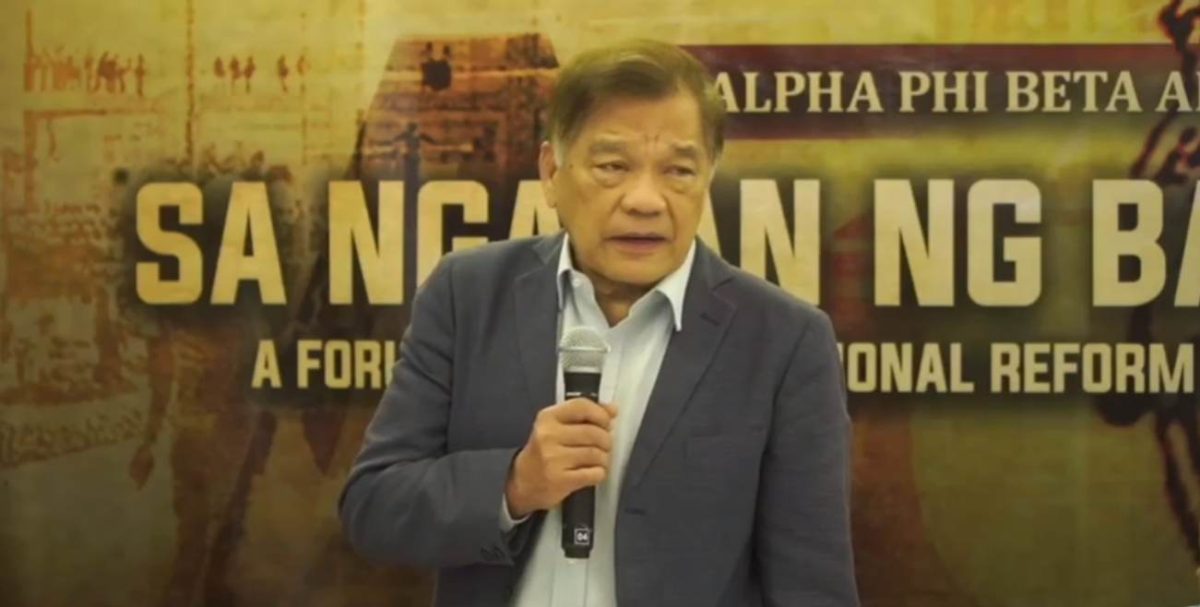The 2022 Alpha Phi Beta Anniversary Forum Bring Together Panelists for a Discussion on Constitutional Amendment

SHARE
Last November 14, the Alpha Phi Beta Anniversary Forum took place at the Manila Hotel. Titled ‘Sa Nagalan ng Batas at Bayan’, this aimed to get differing points of view, as well as acknowledge the electoral and political realities, on why there should be a constitutional reform or not.

The four panelists were as follows: Hon. Jonathan Malaya, Executive Director of the Local Government Development Institute and Former DILG Undersecretary (Usec); Atty. Joey Lina, Former Senator, Governor, and DILG Secretary; Dr. Temario “Temy” Rivera, Chairperson of Center for People Empowerment in Governance; and Cong. Edcel Lagman, Liberal Party President and Albay First District Representative.
Hon. Jonathan Malaya on the Implementation of the Constitution Malaya focused on the impact of how the 1987 constitution was drafted to its implementation via respective laws. He asserted that an unelected body of 48 people handpicked by the late former president Cory Aquino were behind this and it was so because they were rushing after former president Ferdinand Marcos’ exit from the government.

“A good constitution reflects the aspiration if the State, its basic values and commitments, and its obligations to the Society,” he explained as he tackled the Bill of Rights. He also stressed that the constitution has provisions that are anti-political dynasty but it hasn’t been implemented for more than 3 decades since there was no specific definition. “The constitution is not a perfect document. There is no perfect constitution anywhere in the world,” he pointed out.
His example of this perceived imperfection is the restriction on foreign direct investment. He claimed that we are the only country in the world to have that provision in the constitution itself. In other countries, it was stated instead in their economic policy.
In closing, Malaya believed that incremental approach would work best, which is “reforming or adapting existing institutions rather than abolishing or changing them completely.” He admitted that he is a federalist and that should there be a constitutional reform or charter change, it should be done via a plebiscite so Filipino citizens have the final say, not the president.
Sen. Joey Lina on Power Balance Like Malaya, he thinks that “any law is only as good as it is implemented.” His example is the provision for affordable decent housing, which is an important law authored by him, thus it was dubbed the “Lina Law”. RA 7972 is The Urban Development and Housing Act of 1992. However, there is still housing shortage. “We can still see the clear evidence of homelessness in our country.”

For Lina, if there is still a very wide gap between the rich and the poor, then, regulatory measures, like the law of the land, will be hijacked, if the power balance isn’t tilted. Dr. Temario Rivera on Not Amending the Constitution “It cannot by definition address very specific problems and very specific questions,” is how he viewed the 1987 constitution.
Rivera thinks the rational alternative is not to amend the constitution, but instead pass legislation to address specific problems. Should charter change push through, it “may end up creating more problems.” He cited a principle in social science regarding massive social engineering when changing the constitution and ending up with more problems instead. He also mentioned the smartmatic voting as an example: “Nawala yung accountability and transparency of the process.”
This does not come as a surprise, since last May 2022, he held a talk discussing the voting system, if it is continuity or change. Cong. Edcel Lagman on the Principal Ways of Amending the Constitution “I agree that specific problems can be adequately addressed by proper legislation provided that there be a sincere, expeditious, and full implementation of the law,” said Lagman.

He pointed out, though, that every time there is am independent survey proposing charter change, the people are against it. He asserts that this is because people fear that constitutional amendment would actually give politicians more power. He said that even though there is a third way of amending the constitution which is via people’s initiative, there are actually only two which are principal modes: constituent assembly or constitutional convention.
Self-serving interests of incumbent representatives and senators are detrimental to a constitutent assembly. Also, there is a prejudicial question whether voting will be done per chamber or per individual constituent. Prior to a convention, this matter should be resolved by the Supreme Court first. Lagman is very vocal in pointing out the Marcos administration is not “initiation amending the 1987 Constitution”.
RELATED ARTICLES

ISSA Introduces New Artistic Chapter with Latest Release “Alaala”

Smartwatch-Level Performance for Real-World Movement: The HUAWEI Band 11 Series Elevates the Band Experience for as Low as PHP 2,399

Mark Wahlberg and Jonathan Roumie on Faith That Calls for Sacrifice

HUAWEI Mate 80 Pro and WATCH GT Runner 2 Coming to the Philippines in April








